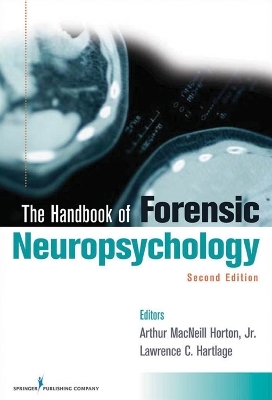
The Handbook of Forensic Neuropsychology
Springer Publishing Co Inc (Verlag)
978-0-8261-1885-1 (ISBN)
This book serves as an updated authoritative contemporary reference work intended for use by forensic neuropsychologists, psychiatrists, neurologists, neurosurgeons, pediatricians, attorneys, judges, law students, police officers, special educators, and clinical and school psychologists, among other professionals. This book discusses the foundations of forensic neuropsychology, ethical/legal issues, practice issues and special areas and populations. Key topics discussed include the principles of brain structure and function, history of clinical neuropsychology, neuropsychology of intelligence, normative and scaling issues, and symptom validity testing and neuroimaging. Special areas and populations will include disability and fitness for duty evaluations, aging and dementia, children and adolescents, autism spectrum disorders, substance abuse, and Neurotoxicology. A concluding section focuses on the future of forensic neuropsychology.
Arthur MacNeill Horton, Jr., is in independent practice as Director of the Neuropsychology Clinic at Psych Associates of Maryland in Towson, Columbia and Bethesda, Maryland and consults on neuropsychology and drug abuse research issues. Dr. Lawrence Hartlage has served as president of the National Academy of Neuropsychology; the American Psychological Association division of Neuropsychology; and the American Board of Professional Neuropsychology. Elected to Fellow status by seven divisions of the American Psychological Association, he was a charter Fellow of the American Psychological Society and listed in the inaugural “Who’s Who in Medicine and Healthcare.” He has served as consultant to the Canadian Research Council; Center for Disease Control; North Atlantic Treaty Organization; National Institutes of Health and U.S. Surgeon General.
Section I Foundations of Neuropsychology
Chapter 1-Overview of Forensic Neuropsychology
Chapter 2-Principles of Brain Structure and Function
Chapter 3-Historical Influences in Forensic Neuropsychology
Chapter 4-Neuropsychology of Intelligence: Forensic Implications
Chapter 5-Normative Data and Scaling Issues in Neuropsychology
Chapter 6-Detecting Exaggeration, Poor Effort and Malingering in Neuropsychology
Chapter 7-Neuroimaging of Aggression: Empirical Findings and Implications
Section II Ethical/Legal issues in neuropsychology
Chapter 8- Maximizing Test Security in Forensic Neuropsychology
Chapter 9-Neuropsychological Evaluations in the Context of Competency Decisions
Chapter 10-Criminal Law, Competency, Insanity, and Dangerousness
Chapter 11-Privacy, Confidentiality, and Privilege in Forensic Neuropsychology
Chapter 12-Conflicts of Interest and Other Nettlesome Pitfalls for the Expert Witness
Section III Practice issues in neuropsychology
Chapter 13-Depositions
Chapter 14-Neuropsychology in the Courtroom
Chapter 15-Forensic Neuropsychological Assessment of Members of
Minority Groups: The Case for Assessing Hispanics
Chapter 16-When Change Matters: Objective Methods for Measuring Change in Neuropsychological Test Scores
Chapter 17 The Estimation of Premorbid IQ
Chapter 18-Ecological Validity Issues that Arise in Medi-Legal Cases When
Neuropsychologists are Asked to Assess Patients With Traumatic Brain Injuries
Section IV Special areas and populations in neuropsychology
Chapter 19-The Admissibility of Neuropsychological Evidence: A Primer
Chapter 20-Neuropsychological Assessment in Disability Determination, Fitness for Duty Evaluations and Rehabilitation Planning
Chapter 21-Forensic Neuropsychology and the Older Client
Chapter 22-Providing Forensic Neuropsychological Services to Children and Youth Chapter 23-Special Difficulties of Autism Spectrum Disorders in the Forensic Arena Chapter 24-Neuropsychology of Substance Use Disorders in Forensic Settings
Chapter 25 Neurotoxicology
Section V Conclusion
Chapter 26-Forensic Neuropsychology in the Future
| Erscheint lt. Verlag | 30.3.2010 |
|---|---|
| Verlagsort | New York |
| Sprache | englisch |
| Gewicht | 1186 g |
| Themenwelt | Geisteswissenschaften ► Psychologie ► Biopsychologie / Neurowissenschaften |
| ISBN-10 | 0-8261-1885-2 / 0826118852 |
| ISBN-13 | 978-0-8261-1885-1 / 9780826118851 |
| Zustand | Neuware |
| Haben Sie eine Frage zum Produkt? |
aus dem Bereich


